Sneezing is a common symptom that can occur in budgies for various reasons. In this article, we will discuss the causes, signs and symptoms, prevention, and treatment of sneezing in budgies.
It is important for budgie owners to understand the causes of sneezing in order to prevent and treat the issue effectively. Additionally, understanding the signs and symptoms can help owners identify if their bird is experiencing sneezing and take appropriate action.
However, you must be here because you want to know why your bird is sneezing so frequently. Well, if you are looking for a solution, you must be on the right track. Check out this blog post and you will learn the reasons properly.
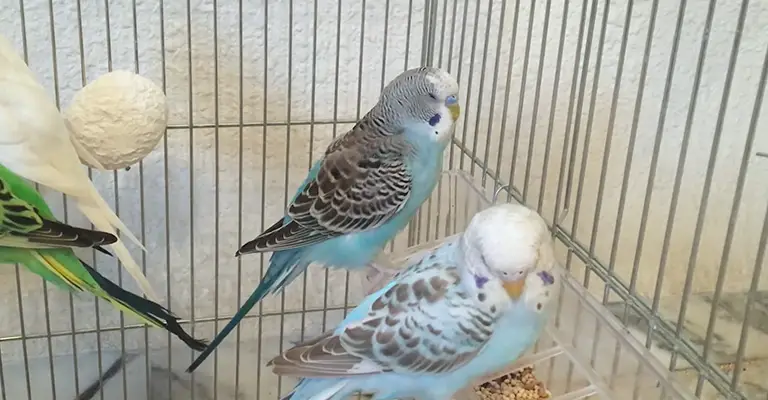
Common Causes of Sneezing in Budgies
Here are the most common causes you need to check out while finding out what bothers your bird and why it is sneezing.
Smoking by the Owner
Secondhand smoke can irritate the respiratory system of budgies and cause them to sneeze. If you smoke near your budgie, it is best to keep them in a different room or to smoke outside to prevent this from happening.
Feather Dust During Moulting
Budgies naturally shed their feathers during a process called molting. As the feathers come out, they release a powdery substance called feather dust.
This dust can be inhaled by the budgie, causing them to sneeze. To reduce feather dust in the air, you can use a damp cloth to wipe down your budgie’s cage and surrounding areas.
Allergies to Aerosol Particles
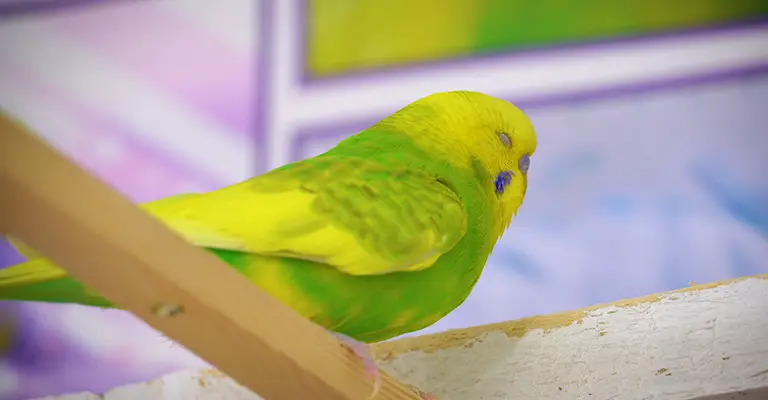
Just like humans, budgies can develop allergies to certain particles in the air such as cleaning products, perfumes, or aerosol sprays.
These particles can cause sneezing and other respiratory symptoms. If you suspect your budgie may have an allergy, try to identify and eliminate the source of the allergen.
Dry Air or Poor Humidity
Budgies need a certain level of humidity to keep their respiratory system healthy. If the air is too dry, it can cause sneezing and other respiratory issues. To increase humidity, you can use a humidifier or place a bowl of water in the budgie’s cage.
Vitamin-a Deficiency
Vitamin-A is essential for the health of the respiratory system. A deficiency of this vitamin can cause sneezing and other respiratory issues.
Make sure to provide your budgie with a balanced diet that includes fresh fruits and vegetables that are high in vitamin-A, such as carrots or sweet potatoes.
Excessive Nose Picking
Budgies may also sneeze if they pick their nose too much. This behavior can be caused by a variety of factors such as stress, a dirty environment, or a respiratory infection. Keep your budgie’s environment clean, provide a healthy diet and toys, and seek veterinary advice if the behavior persists.
How to Prevent Sneezing in Budgies
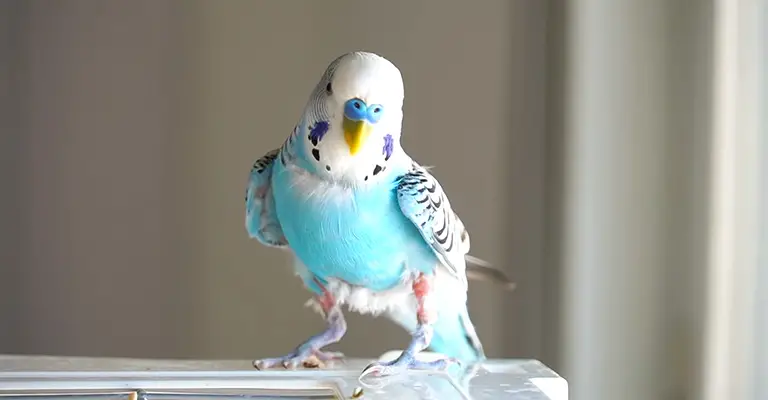
Preventing sneezing in budgies is essential for maintaining their respiratory health. Here are some tips to help you create a suitable environment and provide the necessary care to minimize sneezing in budgies:
Maintain Proper Humidity
Budgies are tropical birds and require a certain level of humidity to keep their respiratory system healthy. To prevent dry air from causing sneezing, mist the bird’s cage regularly using a fine spray bottle. Alternatively, you can place a shallow dish of water inside the cage to increase humidity levels.
Ensure Sufficient Vitamin-A Intake
Vitamin-A deficiency can contribute to sneezing in budgies. Make sure your budgie’s diet includes foods rich in Vitamin-A. Fresh fruits and vegetables such as carrots, sweet potatoes, and dark leafy greens are excellent sources of this essential nutrient.
Offer Regular Bathing Opportunities
Bathing helps budgies remove dust and debris from their feathers, reducing the risk of sneezing caused by feather dust.
Provide a shallow dish of water or use a misting bottle to offer your budgie a bath. Most budgies enjoy bathing but observe your bird’s preferences to find the method they are most comfortable with.
Maintain a Clean Environment
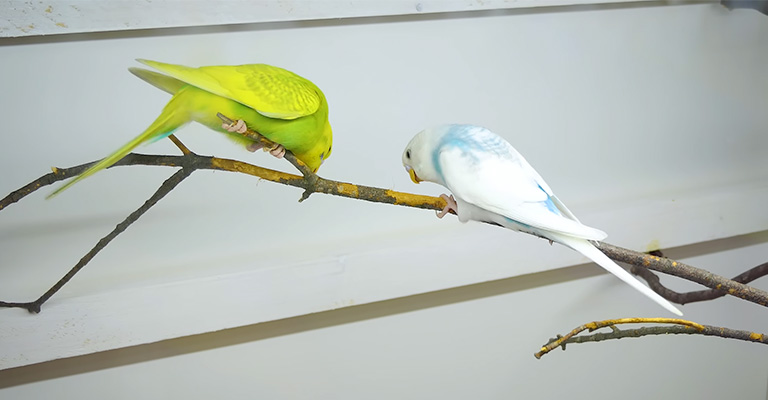
A clean cage and surrounding area can help minimize sneezing caused by allergens and irritants. Regularly clean the cage, including perches, toys, and food/water dishes, to prevent the accumulation of dust and debris.
Use mild, bird-safe cleaning products. Additionally, keep the surrounding area free from potential allergens like smoke or strong cleaning chemicals.
Avoid Smoking and Ensure Proper Ventilation
Smoking near budgies can severely impact their respiratory health. Avoid smoking in the vicinity of your budgie, as even second-hand smoke can be harmful.
Ensure that the bird’s cage is placed in a well-ventilated area to reduce exposure to smoke and other airborne pollutants.
Regular Veterinary Check-ups
Regular visits to an avian veterinarian are crucial for maintaining your budgie’s overall health. They can assess your bird’s respiratory system, provide guidance on diet and care, and detect any potential health issues early on.
Signs and Symptoms of Sneezing in Budgies
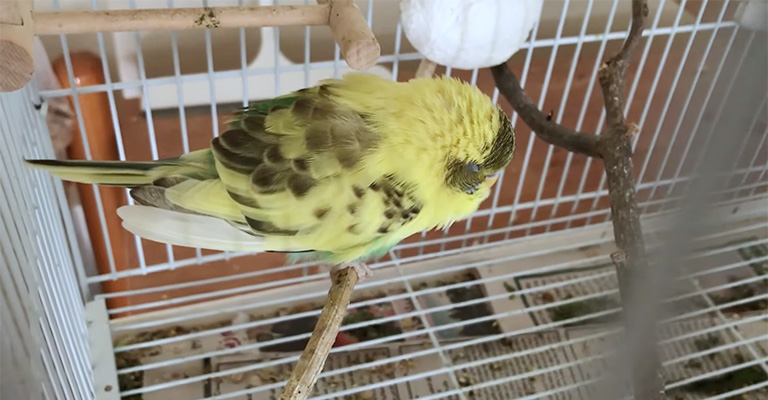
Sneezing in budgies can be a normal occurrence as they may occasionally sneeze to clear their nasal passages.
However, when sneezing becomes frequent or is accompanied by other symptoms, it may indicate an underlying health issue. Here are some signs and symptoms to watch for:
Frequent Sneezing
While occasional sneezing is normal, frequent or repetitive sneezing can be a cause for concern. If your budgie is sneezing consistently throughout the day or over an extended period, it may suggest an underlying respiratory problem.
Runny Nose or Nasal Discharge
Excessive nasal discharge, whether clear or cloudy, is a common sign of respiratory infections or irritations in budgies. The discharge may appear around the nostrils or crust around the nares.
If the discharge has an unpleasant odor or changes in color (such as becoming green or yellow), it may indicate a bacterial infection.
Coughing or Wheezing
Budgies experiencing respiratory distress may exhibit coughing or wheezing sounds. These symptoms indicate inflammation or infection in the bird’s airways and should not be ignored.
Eye and Nose Discharge
Sneezing can sometimes be accompanied by discharge from the eyes or nose. The discharge may be clear or cloudy and may be accompanied by redness, swelling, or crusting around the eyes. This can indicate respiratory infections, allergies, or other underlying health issues.
Loss of Appetite and Lethargy
Budgies with respiratory problems may experience a loss of appetite and appear less active or lethargic. If your budgie shows a sudden decline in energy levels, has trouble perching, or loses interest in eating, it may be a sign of respiratory distress.
Feather Condition
Respiratory issues can also affect a budgie’s feather condition. You may notice a decrease in preening behavior, feather plucking, or a deterioration in feather quality. This can be due to the bird’s overall health being compromised by respiratory problems.
Treatment
Treatment is crucial when it comes to addressing sneezing in budgies. Here are some treatment options to consider.
Veterinary Consultation
If your budgie is sneezing frequently or showing other signs of respiratory distress, seek veterinary care immediately.
A professional avian veterinarian can perform a thorough examination, conduct necessary tests, and provide an accurate diagnosis.
Medication
Depending on the underlying cause, the veterinarian may prescribe medication to address infections, inflammation, or other respiratory issues. Follow the prescribed dosage and administration instructions carefully.
Supportive Care
Follow the veterinarian’s instructions for caring for your budgie during its recovery. This may include maintaining a clean and hygienic cage, providing a humid environment, and avoiding exposure to irritants.
Isolation
If you have multiple birds and one is sick, it is essential to separate the sick bird to prevent the spread of any infections to other birds. Isolation also allows for focused care and monitoring of the sick budgie’s progress.
Follow-up Visits
Stay in close communication with your avian veterinarian and attend any scheduled follow-up visits. These visits are crucial to monitor your budgie’s progress, adjust the treatment plan if necessary, and ensure a full recovery.
FAQs
Sneezing in budgies can be a sign of a serious illness, such as a respiratory infection or pneumonia. It is important to seek the advice of a veterinarian familiar with avian medicine if your budgie is showing signs of infection or illness.
Allergies in budgies can be difficult to diagnose, but common symptoms include sneezing, coughing, wheezing, and runny nose. If your bird is showing these symptoms and they persist even after removing potential allergens from the environment, it is best to seek the advice of a veterinarian.
Budgies can be susceptible to some of the same respiratory infections as humans, but they are generally not as susceptible as other pet birds such as parrots. However, it is still possible for a budgie to catch a cold from a human, so it’s important to practice good hygiene and keep the bird’s environment clean.
The treatment for sneezing in budgies will depend on the underlying cause. In some cases, such as allergies or Vitamin-A deficiency, the symptoms can be treated by making changes to the bird’s environment or diet. In other cases, such as a respiratory infection, treatment with antibiotics may be necessary. A veterinarian familiar with avian medicine should be consulted to determine the best course of treatment.
It is not uncommon for budgies to sneeze occasionally, especially if they have been exposed to dust or other irritants. However, if your bird is sneezing frequently or showing other signs of illness, it is best to seek the advice of a veterinarian.
Wrapping Up
Sneezing is a common symptom in budgies that can be caused by a variety of factors, including smoking by the owner, feather dust during molting, allergies to aerosol particles, dry air or poor humidity, Vitamin-A deficiency, and excessive nose picking.
It is important to understand the causes of sneezing in order to prevent it and ensure the bird’s overall health and well-being.
Make sure to be aware of other signs and symptoms of sneezing in budgies, such as runny nose, coughing or wheezing, discharge from the eyes or nose, loss of appetite, lethargy, and loss of feather condition.
In case of any signs or symptoms of infection or illness, it is always advisable to seek the advice of a veterinarian familiar with avian medicine.
Remember that sneezing in budgies can be caused by a variety of factors and it is important to be aware of the causes, signs, and symptoms in order to prevent it and ensure the bird’s overall health and well-being.
If needed, seeking veterinary assistance is always recommended. Thank you for your time.